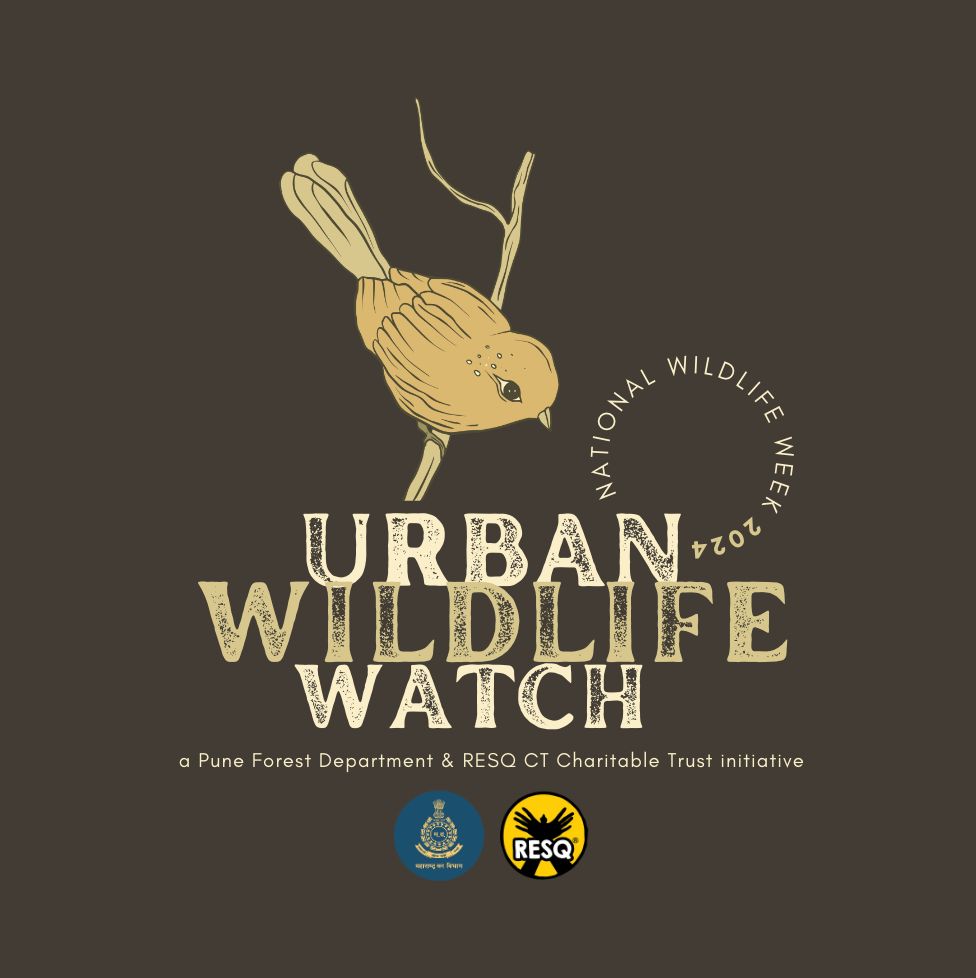[ad_1]
Pune, 30th September 2024: In celebration of Wildlife Week 2024, the Pune Forest Department, in collaboration with RESQ Charitable Trust, is launching the Urban Wildlife Patrol, a unique citizen-driven campaign to document the rich faunal biodiversity within the Pune and Pimpri-Chinchwad Municipal Corporation (PCMC) areas. This initiative will run from October 2 to October 8, 2024, inviting citizens to step into the role of wildlife explorers and contribute to local conservation efforts by documenting wildlife sightings.
The Urban Wildlife Patrol aims to engage the public in creating a comprehensive list of species found in urban and peri-urban areas of Pune and PCMC. By encouraging citizens to observe and report local wildlife, the campaign will help to map Pune’s faunal biodiversity and inform future conservation and rehabilitation efforts.
Participants can report sightings of any wildlife species—be it birds, mammals, reptiles, amphibians, or insects—via an easy-to-use online data collection form. These reports will contribute to a growing database, helping experts identify key areas for conservation and potential soft-release sites for rehabilitated animals who are rescued from the city.
“Our city is teeming with wildlife that often goes unnoticed,” said Mahadev Mohite, Deputy Conservator of Forests, Pune Forest Department. “This initiative empowers citizens to play a direct role in conservation efforts and helps us gather crucial data for habitat mapping and biodiversity preservation.”
The Urban Wildlife Patrol aims to achieve several key objectives. First, the campaign focuses on biodiversity documentation by compiling a comprehensive inventory of faunal species found in the urban and peri-urban habitats of Pune and PCMC. This data will aid in habitat mapping, identifying biodiversity-rich areas that can guide future conservation and rehabilitation efforts. Through community engagement, the initiative seeks to foster a deeper connection between the public and local wildlife, promoting awareness and encouraging stewardship of urban biodiversity. Additionally, the data utilisation component will ensure that the collected information is used effectively for conservation planning, including identifying potential soft-release sites for rehabilitated wildlife, ultimately contributing to the region’s overall biodiversity conservation strategy.
“We believe that every citizen can make a difference,” stated Nachiket Utpat, Director – Human-Wildlife Interactions Management, RESQ Charitable Trust. “By participating in Urban Wildlife Patrol, people can contribute to meaningful conservation efforts while rediscovering the natural beauty around them.”
How to Participate:
Step 2: Take clear photos from your mobile phone of any wildlife observed. High-quality images are not necessary; the species just needs to be visible for identification.
Step 3: Submit sightings through the online form, including the location. Use one form submission per species observed.
Step 4: Receive a personalised email certificate acknowledging your contribution to wildlife conservation.
Step 5: Share experiences on social media using the hashtag #UrbanWildlifePatrol to inspire others.
The campaign welcomes all levels of participation, from casual observers to avid wildlife enthusiasts. The collected data will be carefully reviewed by experts, and findings will be compiled into a comprehensive biodiversity list of the Pune and PCMC regions.
“To express appreciation for citizen participation, each contributor will receive a personalised email certificate acknowledging their efforts in wildlife conservation. The Urban Wildlife Patrol is expected to significantly enhance the biodiversity records for Pune and PCMC, aiding the Pune Forest Department in its conservation planning. Additionally, the initiative will foster greater public awareness about urban wildlife and inspire citizens to actively participate in local conservation efforts.”, says Mohite.
Guidelines for Participants:
•Observe wildlife from a distance without disturbing the animals or their habitats.
•Be mindful of your surroundings and avoid entering restricted or unsafe areas.
•Refrain from using flash or any form of disruptive photography that could harm or startle wildlife.
[ad_2]
